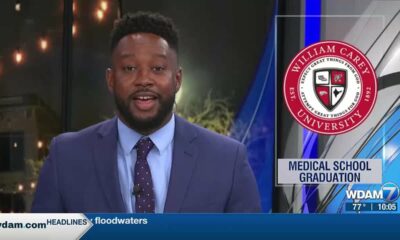Kaiser Health News
Florida Gov. Ron DeSantis Injects Presidential Politics Into the Covid Vaccine Debate
Phil Galewitz, KFF Health News and Daniel Chang
Mon, 18 Sep 2023 17:35:00 +0000
As Americans consider whether to take advice from federal health officials and get an updated covid vaccine, Florida Gov. Ron DeSantis is drumming the message that ignited his national political career: Ignore what the federal government tells you about covid-19.
Last week — as polling showed him running a distant second to Donald Trump for the Republican presidential nomination — DeSantis convened a virtual roundtable featuring a panel of covid vaccine skeptics. Their mission: to swat away the FDA's findings that the new shots are safe and effective for those 6 months and older.
Instead, they advised those younger than 65 not to get vaccinated, suggesting without evidence that the shots could be harmful.
“I will not stand by and let the FDA and CDC use healthy Floridians as guinea pigs for new booster shots that have not been proven to be safe or effective,” said DeSantis, contradicting the FDA's findings. “Once again, Florida is the first state in the nation to stand up and provide guidance based on truth, not Washington edicts.”
Backing up DeSantis was the handpicked keeper of his public health strategy: his state's surgeon general, Joseph Ladapo.
“My judgment is that it's not a good decision for young people and for people who are not at high risk at this point in the pandemic,” Ladapo said.
Ladapo has come under fire from public health experts since DeSantis tapped him for the role. He has been rebuked by federal health officials for promoting misinformation about covid and vaccines generally. And a report by the faculty of the University of Florida's College of Medicine expressed “concern for research integrity violations” in a state health department study that suggested receiving an mRNA vaccine against covid increased the risk of death among young men.
Ladapo personally altered the study's findings, Politico reported. And research has shown the risk of cardiac complications among young men is up to 5.6 times as high after covid infection as after covid vaccination.
With public health officials facing an uphill battle to persuade Americans to get one of the updated vaccines — just 17% received the 2022 booster — DeSantis' tactic could further depress uptake by stoking doubts about the vaccines.
DeSantis is “playing with fire, and this is about life and death,” said Donna Shalala, who served as U.S. Health and Human Services secretary during the Clinton administration and later represented Florida in Congress.
“But I think people will see it for what it is: a desperate attempt at very high risk to people in Florida to reposition himself,” she said.
DeSantis trails Trump by more than 40 points, on average, in polls of GOP primary voters, a gap that has widened despite the governor's recent efforts to reboot his campaign.
More than 90,000 people in Florida have died from covid-19.
And, while there have been a few serious side effects associated with covid vaccines, their incidence is rare and several studies have shown that vaccinated people are at no greater risk of death from non-covid causes than those who are unvaccinated. More than 600 million doses of covid vaccines have been administered in the U.S., according to Our World in Data.
That information was not mentioned in the discussion last week, when the panel — which notably included no vaccine or infectious disease experts — said without evidence that the shots might have “negative efficacy” or even cause increased infection from the virus.
DeSantis and Ladapo said they were troubled by the lack of human trials before the latest covid vaccines were authorized — though they did not address why they might be less concerned about the risks for those age 65 and older.
Annual flu vaccines also do not undergo clinical testing on humans. But Ladapo called it “sleight of hand” to compare the covid boosters to the flu vaccine, because it has been around for decades. “It is a completely different phenomenon,” he said.
The Florida Health Department did not respond to questions about whether it recommends the flu vaccine in light of its dearth of human testing.
Daniel Salmon, a vaccine expert at Johns Hopkins University who watched the roundtable, said he took issue with the claim that there wasn't clinical data supporting the new vaccines' safe use. Like the flu vaccine, the primary covid vaccines went through clinical trials, and there wouldn't be time to conduct one every time a new strain emerges, he said.
The discussion was not a robust debate around scientific uncertainty among experts, Salmon said. He noted the panelists' lack of expertise and training in vaccines and infectious disease, saying they instead leaned on their positions as physicians, academics, and the Florida surgeon general to give them credibility.
“They don't know covid,” Salmon said. “They're cherry-picking facts to defend their position. And they don't have the expertise to make those decisions for a large number of people.”
“It felt to me like they were trying to sow doubt,” he said, “and that's dangerous.”
Polling by the nonprofit health organization KFF shows that most Americans encounter health misinformation, and many are uncertain about the veracity of claims about the covid vaccines.
DeSantis built his national reputation on bucking the medical establishment and ending 2020's pandemic lockdown earlier in Florida than many other states did. He also has gained a following — and raised money — by criticizing the federal government under President Joe Biden and guidance from the nation's former top infectious disease expert, Anthony Fauci, who left his post at the National Institutes of Health in December.
DeSantis' handling of the covid response helped propel him to a massive reelection victory last year and to the front of the pack of 2024 Republican presidential contenders this spring.
David Richards, chair of the International Relations and Political Science Department at Lynchburg University in Virginia, said he is not surprised by DeSantis' approach to the updated vaccines given his polling numbers, his reputation for pushing “medical freedom,” and his general vaccine policies.
“He needs to remain relevant and set himself apart from other candidates,” he said.
Last year, DeSantis opposed providing covid vaccines to young children after Florida came under fire for being the only state not to preorder doses ahead of the federal government's approval of vaccination for children under 5.
This year, DeSantis urged Florida's GOP-controlled legislature to approve pandemic-related legislation that runs counter to some public health recommendations, including measures to permanently ban school mask mandates and bar businesses from firing employees who don't get vaccinated.
Matt Dallek, a political historian at George Washington University in Washington, D.C., said DeSantis' messaging on the new covid vaccines shows his desire to distance himself from Trump — even though Trump's 2018 endorsement led to his winning the Florida governor's race.
“This is a way for him to exploit the issue, though it may come at the expense of lives of anyone who would listen to him in Florida and elsewhere,” he said.
——————————
By: Phil Galewitz, KFF Health News and Daniel Chang
Title: Florida Gov. Ron DeSantis Injects Presidential Politics Into the Covid Vaccine Debate
Sourced From: kffhealthnews.org/news/article/florida-governor-ron-desantis-presidential-politics-covid-vaccine-debate/
Published Date: Mon, 18 Sep 2023 17:35:00 +0000
Kaiser Health News
The Lure of Specialty Medicine Pulls Nurse Practitioners From Primary Care
Michelle Andrews
Fri, 17 May 2024 09:00:00 +0000
For many patients, seeing a nurse practitioner has become a routine part of primary care, in which these “NPs” often perform the same tasks that patients have relied on doctors for.
But NPs in specialty care? That's not routine, at least not yet. Increasingly, though, nurse practitioners and physician assistants are joining cardiology, dermatology, and other specialty practices, broadening their skills and increasing their income.
This development worries some people who track the health workforce, because current trends suggest primary care, which has counted on nurse practitioners to backstop physician shortages, soon might not be able to rely on them to the same extent.
“They're succumbing to the same challenges that we have with physicians,” said Atul Grover, executive director of the Research and Action Institute at the Association of American Medical Colleges. The rates NPs can command in a specialty practice “are quite a bit higher” than practice salaries in primary care, he said.
When nurse practitioner programs began to proliferate in the 1970s, “at first it looked great, producing all these nurse practitioners that go to work with primary care physicians,” said Yalda Jabbarpour, director of the American Academy of Family Physicians' Robert Graham Center for Policy Studies. “But now only 30% are going into primary care.”
Jabbarpour was referring to the 2024 primary care scorecard by the Milbank Memorial Fund, which found that from 2016 to 2021 the proportion of nurse practitioners who worked in primary care practices hovered between 32% and 34%, even though their numbers grew rapidly. The proportion of physician assistants, also known as physician associates, in primary care ranged from 27% to 30%, the study found.
Both nurse practitioners and physician assistants are advanced practice clinicians who, in addition to graduate degrees, must complete distinct education, training, and certification steps. NPs can practice without a doctor's supervision in more than two dozen states, while PAs have similar independence in only a handful of states.
About 88% of nurse practitioners are certified in an area of primary care, according to the American Association of Nurse Practitioners. But it is difficult to track exactly how many work in primary care or in specialty practices. Unlike physicians, they're generally not required to be endorsed by a national standard-setting body to practice in specialties like oncology or cardiology, for example. The AANP declined to answer questions about its annual workforce survey or the extent to which primary care NPs are moving toward specialties.
Though data tracking the change is sparse, specialty practices are adding these advanced practice clinicians at almost the same rate as primary care practices, according to frequently cited research published in 2018.
The clearest evidence of the shift: From 2008 to 2016, there was a 22% increase in the number of specialty practices that employed nurse practitioners and physician assistants, according to that study. The increase in the number of primary care practices that employed these professionals was 24%.
Once more, the most recent projections by the Association of American Medical Colleges predict a dearth of at least 20,200 primary care physicians by 2036. There will also be a shortfall of non-primary care specialists, including a deficiency of at least 10,100 surgical physicians and up to 25,000 physicians in other specialties.
When it comes to the actual work performed, the lines between primary and specialty care are often blurred, said Candice Chen, associate professor of health policy and management at George Washington University.
“You might be a nurse practitioner working in a gastroenterology clinic or cardiology clinic, but the scope of what you do is starting to overlap with primary care,” she said.
Nurse practitioners' salaries vary widely by location, type of facility, and experience. Still, according to data from health care recruiter AMN Healthcare Physician Solutions, formerly known as Merritt Hawkins, the total annual average starting compensation, including signing bonus, for nurse practitioners and physician assistants in specialty practice was $172,544 in the year that ended March 31, slightly higher than the $166,544 for those in primary care.
According to forecasts from the federal Bureau of Labor Statistics, nurse practitioner jobs will increase faster than jobs in almost any other occupation in the decade leading up to 2032, growing by 123,600 jobs or 45%. (Wind turbine service technician is the only other occupation projected to grow as fast.) The growth rate for physician assistants is also much faster than average, at 27%. There are more than twice as many nurse practitioners as physician assistants, however: 323,900 versus 148,000, in 2022.
To Grover, of the AAMC, numbers like this signal that there will probably be enough NPs, PAs, and physicians to meet primary care needs. At the same time, “expect more NPs and PAs to also flow out into other specialties,” he said.
When Pamela Ograbisz started working as a registered nurse 27 years ago, she worked in a cardiothoracic intensive care unit. After she became a family nurse practitioner a few years later, she found a job with a similar specialty practice, which trained her to take on a bigger role, first running their outpatient clinic, then working on the floor, and later in the intensive care unit.
If nurse practitioners want to specialize, often “the doctors mentor them just like they would with a physician residency,” said Ograbisz, now vice president of clinical operations at temporary placement recruiter LocumTenens.com.
If physician assistants want to specialize, they also can do so through mentoring, or they can receive “certificates of added qualifications” in 10 specialties to demonstrate their expertise. Most employers don't “encourage or require” these certificates, however, said Jennifer Orozco, chief medical officer at the American Academy of Physician Associates.
There are a number of training programs for family nurse practitioners who want to develop skills in other areas.
Raina Hoebelheinrich, 40, a family nurse practitioner at a regional medical center in Yankton, South Dakota, recently enrolled in a three-semester post-master's endocrinology training program at Mount Marty University. She lives on a farm in nearby northeastern Nebraska with her husband and five sons.
Hoebelheinrich's new skills could be helpful in her current hospital job, in which she sees a lot of patients with acute diabetes, or in a clinic setting like the one in Sioux Falls, South Dakota, where she is doing her clinical endocrinology training.
Lack of access to endocrinology care in rural areas is a real problem, and many people may travel hundreds of miles to see a specialist.
“There aren't a lot of options,” she said.
——————————
By: Michelle Andrews
Title: The Lure of Specialty Medicine Pulls Nurse Practitioners From Primary Care
Sourced From: kffhealthnews.org/news/article/nurse-practitioners-trend-primary-care-specialties/
Published Date: Fri, 17 May 2024 09:00:00 +0000
Did you miss our previous article…
https://www.biloxinewsevents.com/clean-needles-save-lives-in-some-states-they-might-not-be-legal/
Kaiser Health News
Clean Needles Save Lives. In Some States, They Might Not Be Legal.
Ed Mahon, Spotlight PA and Sarah Boden, WESA
Fri, 17 May 2024 09:00:00 +0000
Kim Botteicher hardly thinks of herself as a criminal.
On the main floor of a former Catholic church in Bolivar, Pennsylvania, Botteicher runs a flower shop and cafe.
In the former church's basement, she also operates a nonprofit organization focused on helping people caught up in the drug epidemic get back on their feet.
The nonprofit, FAVOR ~ Western PA, sits in a rural pocket of the Allegheny Mountains east of Pittsburgh. Her organization's home county of Westmoreland has seen roughly 100 or more drug overdose deaths each year for the past several years, the majority involving fentanyl.
Thousands more residents in the region have been touched by the scourge of addiction, which is where Botteicher comes in.
She helps people find housing, jobs, and health care, and works with families by running support groups and explaining that substance use disorder is a disease, not a moral failing.
But she has also talked publicly about how she has made sterile syringes available to people who use drugs.
“When that person comes in the door,” she said, “if they are covered with abscesses because they have been using needles that are dirty, or they've been sharing needles — maybe they've got hep C — we see that as, ‘OK, this is our first step.'”
Studies have identified public health benefits associated with syringe exchange services. The Centers for Disease Control and Prevention says these programs reduce HIV and hepatitis C infections, and that new users of the programs are more likely to enter drug treatment and more likely to stop using drugs than nonparticipants.
This harm-reduction strategy is supported by leading health groups, such as the American Medical Association, the World Health Organization, and the International AIDS Society.
But providing clean syringes could put Botteicher in legal danger. Under Pennsylvania law, it's a misdemeanor to distribute drug paraphernalia. The state's definition includes hypodermic syringes, needles, and other objects used for injecting banned drugs. Pennsylvania is one of 12 states that do not implicitly or explicitly authorize syringe services programs through statute or regulation, according to a 2023 analysis. A few of those states, but not Pennsylvania, either don't have a state drug paraphernalia law or don't include syringes in it.
Those working on the front lines of the opioid epidemic, like Botteicher, say a reexamination of Pennsylvania's law is long overdue.
There's an urgency to the issue as well: Billions of dollars have begun flowing into Pennsylvania and other states from legal settlements with companies over their role in the opioid epidemic, and syringe services are among the eligible interventions that could be supported by that money.
The opioid settlements reached between drug companies and distributors and a coalition of state attorneys general included a list of recommendations for spending the money. Expanding syringe services is listed as one of the core strategies.
But in Pennsylvania, where 5,158 people died from a drug overdose in 2022, the state's drug paraphernalia law stands in the way.
Concerns over Botteicher's work with syringe services recently led Westmoreland County officials to cancel an allocation of $150,000 in opioid settlement funds they had previously approved for her organization. County Commissioner Douglas Chew defended the decision by saying the county “is very risk averse.”
Botteicher said her organization had planned to use the money to hire additional recovery specialists, not on syringes. Supporters of syringe services point to the cancellation of funding as evidence of the need to change state law, especially given the recommendations of settlement documents.
“It's just a huge inconsistency,” said Zoe Soslow, who leads overdose prevention work in Pennsylvania for the public health organization Vital Strategies. “It's causing a lot of confusion.”
Though sterile syringes can be purchased from pharmacies without a prescription, handing out free ones to make drug use safer is generally considered illegal — or at least in a legal gray area — in most of the state. In Pennsylvania's two largest cities, Philadelphia and Pittsburgh, officials have used local health powers to provide legal protection to people who operate syringe services programs.
Even so, in Philadelphia, Mayor Cherelle Parker, who took office in January, has made it clear she opposes using opioid settlement money, or any city funds, to pay for the distribution of clean needles, The Philadelphia Inquirer has reported. Parker's position signals a major shift in that city's approach to the opioid epidemic.
On the other side of the state, opioid settlement funds have had a big effect for Prevention Point Pittsburgh, a harm reduction organization. Allegheny County reported spending or committing $325,000 in settlement money as of the end of last year to support the organization's work with sterile syringes and other supplies for safer drug use.
“It was absolutely incredible to not have to fundraise every single dollar for the supplies that go out,” said Prevention Point's executive director, Aaron Arnold. “It takes a lot of energy. It pulls away from actual delivery of services when you're constantly having to find out, ‘Do we have enough money to even purchase the supplies that we want to distribute?'”
In parts of Pennsylvania that lack these legal protections, people sometimes operate underground syringe programs.
The Pennsylvania law banning drug paraphernalia was never intended to apply to syringe services, according to Scott Burris, director of the Center for Public Health Law Research at Temple University. But there have not been court cases in Pennsylvania to clarify the issue, and the failure of the legislature to act creates a chilling effect, he said.
Carla Sofronski, executive director of the Pennsylvania Harm Reduction Network, said she was not aware of anyone having faced criminal charges for operating syringe services in the state, but she noted the threat hangs over people who do and that they are taking a “great risk.”
In 2016, the CDC flagged three Pennsylvania counties — Cambria, Crawford, and Luzerne — among 220 counties nationwide in an assessment of communities potentially vulnerable to the rapid spread of HIV and to new or continuing high rates of hepatitis C infections among people who inject drugs.
Kate Favata, a resident of Luzerne County, said she started using heroin in her late teens and wouldn't be alive today if it weren't for the support and community she found at a syringe services program in Philadelphia.
“It kind of just made me feel like I was in a safe space. And I don't really know if there was like a come-to-God moment or come-to-Jesus moment,” she said. “I just wanted better.”
Favata is now in long-term recovery and works for a medication-assisted treatment program.
At clinics in Cambria and Somerset Counties, Highlands Health provides free or low-cost medical care. Despite the legal risk, the organization has operated a syringe program for several years, while also testing patients for infectious diseases, distributing overdose reversal medication, and offering recovery options.
Rosalie Danchanko, Highlands Health's executive director, said she hopes opioid settlement money can eventually support her organization.
“Why shouldn't that wealth be spread around for all organizations that are working with people affected by the opioid problem?” she asked.
In February, legislation to legalize syringe services in Pennsylvania was approved by a committee and has moved forward. The administration of Gov. Josh Shapiro, a Democrat, supports the legislation. But it faces an uncertain future in the full legislature, in which Democrats have a narrow majority in the House and Republicans control the Senate.
One of the bill's lead sponsors, state Rep. Jim Struzzi, hasn't always supported syringe services. But the Republican from western Pennsylvania said that since his brother died from a drug overdose in 2014, he has come to better understand the nature of addiction.
In the committee vote, nearly all of Struzzi's Republican colleagues opposed the bill. State Rep. Paul Schemel said authorizing the “very instrumentality of abuse” crossed a line for him and “would be enabling an evil.”
After the vote, Struzzi said he wanted to build more bipartisan support. He noted that some of his own skepticism about the programs eased only after he visited Prevention Point Pittsburgh and saw how workers do more than just hand out syringes. These types of programs connect people to resources — overdose reversal medication, wound care, substance use treatment — that can save lives and lead to recovery.
“A lot of these people are … desperate. They're alone. They're afraid. And these programs bring them into someone who cares,” Struzzi said. “And that, to me, is a step in the right direction.”
At her nonprofit in western Pennsylvania, Botteicher is hoping lawmakers take action.
“If it's something that's going to help someone, then why is it illegal?” she said. “It just doesn't make any sense to me.”
This story was co-reported by WESA Public Radio and Spotlight PA, an independent, nonpartisan, and nonprofit newsroom producing investigative and public-service journalism that holds power to account and drives positive change in Pennsylvania.
KFF Health News is a national newsroom that produces in-depth journalism about health issues and is one of the core operating programs at KFF—an independent source of health policy research, polling, and journalism. Learn more about KFF.
USE OUR CONTENT
This story can be republished for free (details).
——————————
By: Ed Mahon, Spotlight PA and Sarah Boden, WESA
Title: Clean Needles Save Lives. In Some States, They Might Not Be Legal.
Sourced From: kffhealthnews.org/news/article/clean-needles-syringe-services-programs-legal-gray-area-risk-pennsylvania/
Published Date: Fri, 17 May 2024 09:00:00 +0000
Kaiser Health News
Watch: John Oliver Dishes on KFF Health News’ Opioid Settlements Series
Fri, 17 May 2024 09:00:00 +0000
Opioid manufacturers, distributors, and retailers are paying tens of billions of dollars in restitution to settle lawsuits related to their role in the nation's overdose epidemic. A recent broadcast of “Last Week Tonight With John Oliver” examined how that money is being spent by state and local governments across the United States.
The segment featured reporting from the KFF Health News series “Payback: Tracking the Opioid Settlement Cash.” You can learn more about the issue and read our collection of articles by Aneri Pattani here.
——————————
Title: Watch: John Oliver Dishes on KFF Health News' Opioid Settlements Series
Sourced From: kffhealthnews.org/news/article/watch-john-oliver-kff-health-news-payback-opioid-settlements-series/
Published Date: Fri, 17 May 2024 09:00:00 +0000
-
SuperTalk FM6 days ago
Martin Lawrence making 3 stops in Mississippi on comedy tour
-
Our Mississippi Home5 days ago
Beat the Heat with Mississippi’s Best Waterparks
-
SuperTalk FM2 days ago
State auditor cracking down on Mississippians receiving unemployment benefits
-
Our Mississippi Home6 days ago
Charlie’s U-Pik: Opening Soon for the Summer Season
-
Mississippi News Video4 days ago
Jackson has a gang problem
-
Kaiser Health News5 days ago
Medicaid ‘Unwinding’ Decried as Biased Against Disabled People
-
Local News1 day ago
Family files lawsuit after teen’s suicide in Harrison County Jail
-
228Sports4 days ago
George County Pours Runs In 6A South State Title Victory At PRC








































